SHR012-6 Assessment 1: Psychological Contracts and Flexible Working
VerifiedAdded on 2023/06/03
|12
|3044
|276
Report
AI Summary
This report delves into the critical concepts of psychological contracts and flexible working, exploring their significance in contemporary organizational settings. It begins by defining psychological contracts as unwritten expectations between employers and employees, analyzing their conceptualization, explicitness, origins, and dimensional components. The report then defines flexible working and its various dimensions, highlighting its importance to both individuals and organizations. The discussion section examines the impact of psychological contracts on employee behavior and organizational performance, as well as the benefits of flexible working, including increased productivity, employee motivation, improved customer service, competitive advantage, and staff retention. The report also emphasizes the importance of flexible working in achieving a better work-life balance for employees. Finally, the report recommends the use of the ADKAR model for implementing changes related to flexible working and psychological contracts, emphasizing the importance of awareness, desire, knowledge, ability, and reinforcement in the change process. This comprehensive analysis provides valuable insights for leaders and managers seeking to optimize workforce management and enhance organizational success.
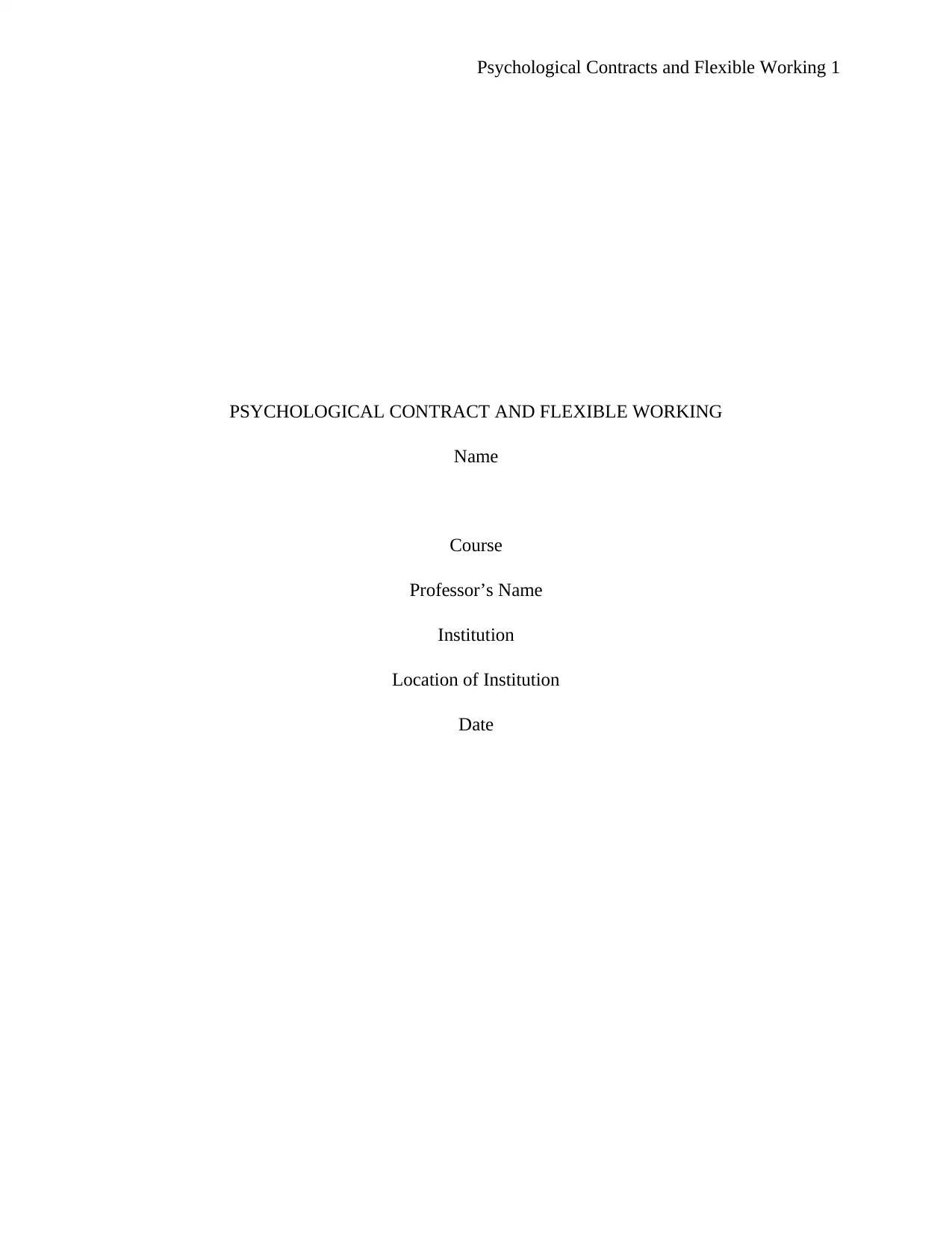
Psychological Contracts and Flexible Working 1
PSYCHOLOGICAL CONTRACT AND FLEXIBLE WORKING
Name
Course
Professor’s Name
Institution
Location of Institution
Date
PSYCHOLOGICAL CONTRACT AND FLEXIBLE WORKING
Name
Course
Professor’s Name
Institution
Location of Institution
Date
Paraphrase This Document
Need a fresh take? Get an instant paraphrase of this document with our AI Paraphraser
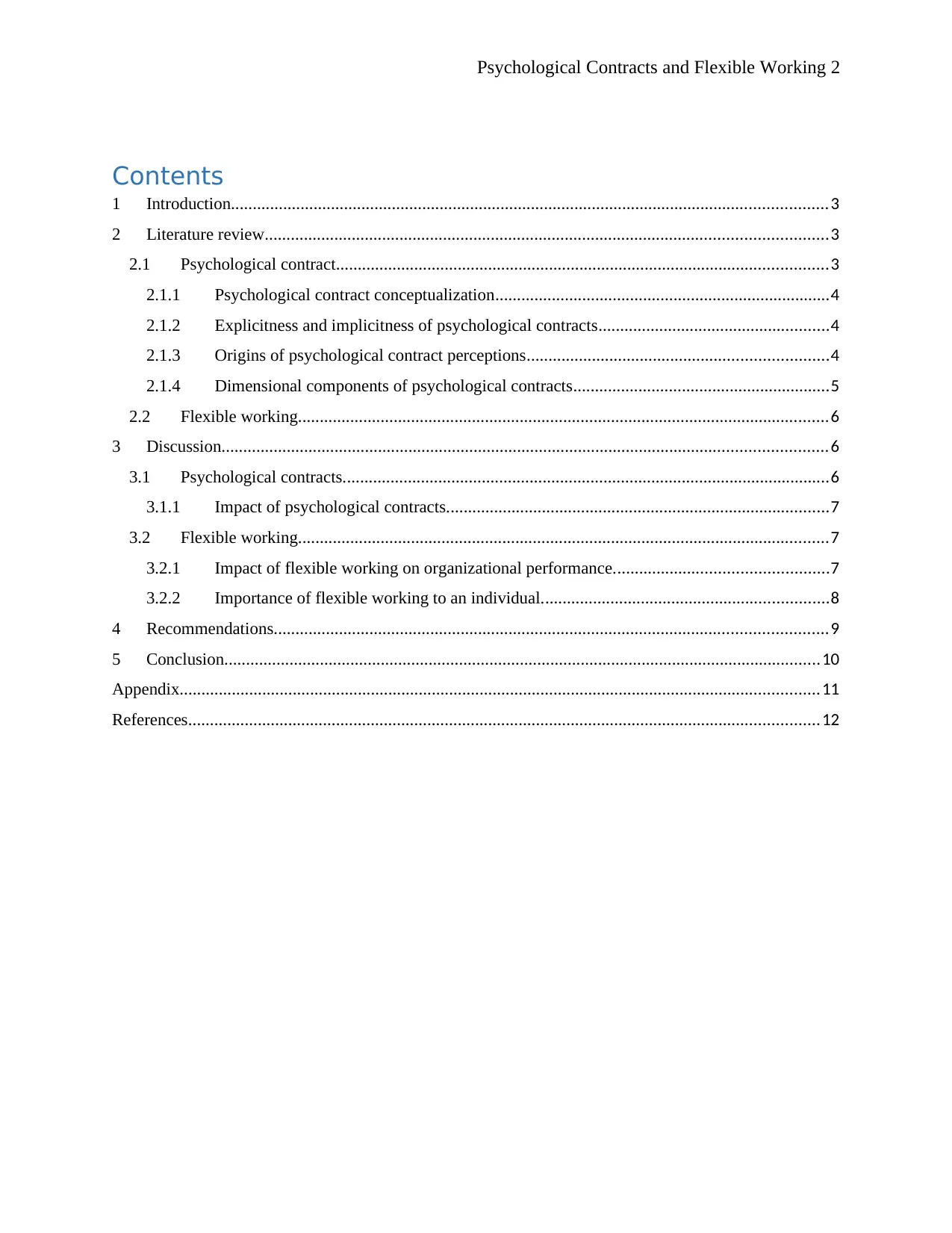
Psychological Contracts and Flexible Working 2
Contents
1 Introduction.........................................................................................................................................3
2 Literature review.................................................................................................................................3
2.1 Psychological contract.................................................................................................................3
2.1.1 Psychological contract conceptualization.............................................................................4
2.1.2 Explicitness and implicitness of psychological contracts.....................................................4
2.1.3 Origins of psychological contract perceptions.....................................................................4
2.1.4 Dimensional components of psychological contracts...........................................................5
2.2 Flexible working..........................................................................................................................6
3 Discussion...........................................................................................................................................6
3.1 Psychological contracts................................................................................................................6
3.1.1 Impact of psychological contracts........................................................................................7
3.2 Flexible working..........................................................................................................................7
3.2.1 Impact of flexible working on organizational performance.................................................7
3.2.2 Importance of flexible working to an individual..................................................................8
4 Recommendations...............................................................................................................................9
5 Conclusion.........................................................................................................................................10
Appendix...................................................................................................................................................11
References.................................................................................................................................................12
Contents
1 Introduction.........................................................................................................................................3
2 Literature review.................................................................................................................................3
2.1 Psychological contract.................................................................................................................3
2.1.1 Psychological contract conceptualization.............................................................................4
2.1.2 Explicitness and implicitness of psychological contracts.....................................................4
2.1.3 Origins of psychological contract perceptions.....................................................................4
2.1.4 Dimensional components of psychological contracts...........................................................5
2.2 Flexible working..........................................................................................................................6
3 Discussion...........................................................................................................................................6
3.1 Psychological contracts................................................................................................................6
3.1.1 Impact of psychological contracts........................................................................................7
3.2 Flexible working..........................................................................................................................7
3.2.1 Impact of flexible working on organizational performance.................................................7
3.2.2 Importance of flexible working to an individual..................................................................8
4 Recommendations...............................................................................................................................9
5 Conclusion.........................................................................................................................................10
Appendix...................................................................................................................................................11
References.................................................................................................................................................12
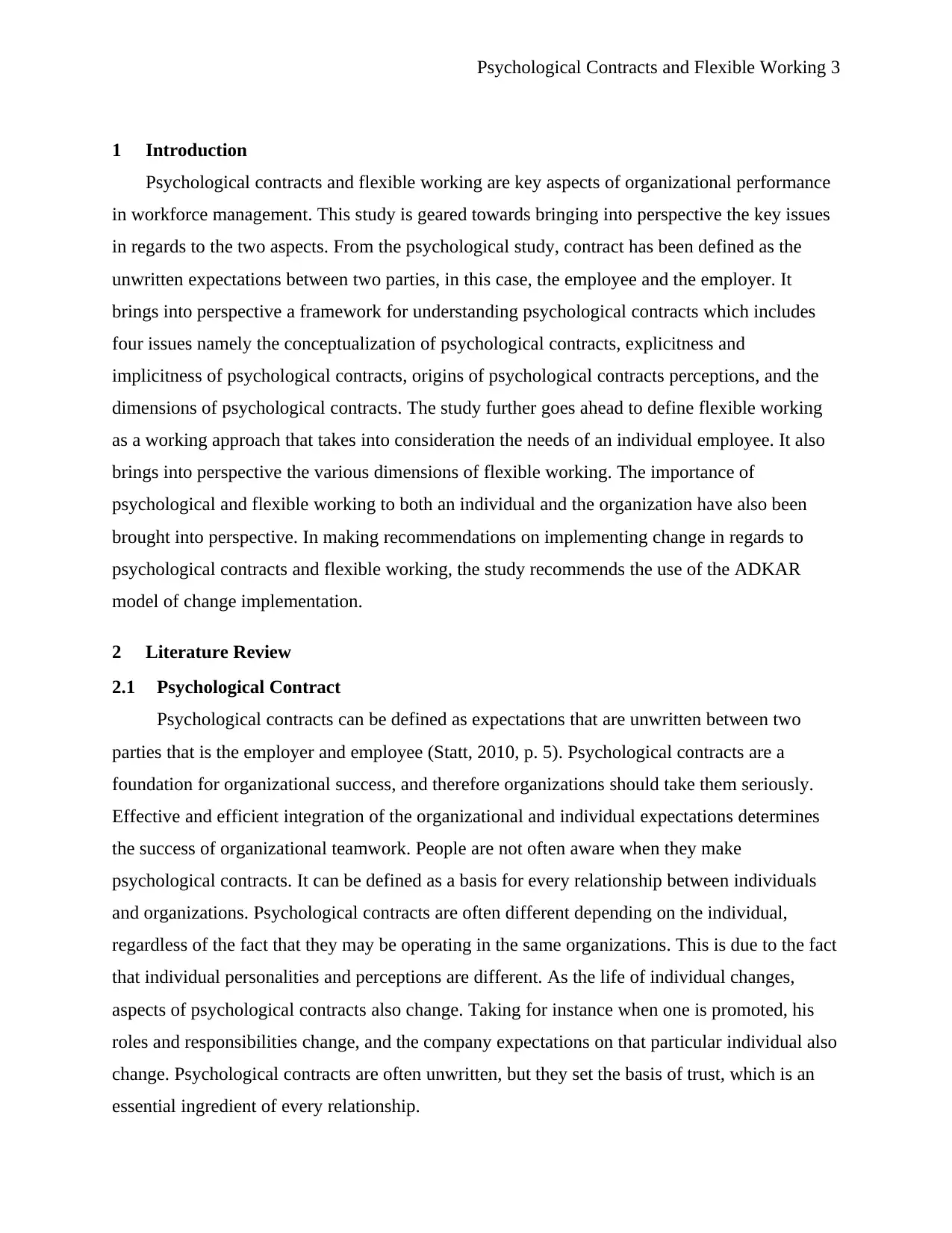
Psychological Contracts and Flexible Working 3
1 Introduction
Psychological contracts and flexible working are key aspects of organizational performance
in workforce management. This study is geared towards bringing into perspective the key issues
in regards to the two aspects. From the psychological study, contract has been defined as the
unwritten expectations between two parties, in this case, the employee and the employer. It
brings into perspective a framework for understanding psychological contracts which includes
four issues namely the conceptualization of psychological contracts, explicitness and
implicitness of psychological contracts, origins of psychological contracts perceptions, and the
dimensions of psychological contracts. The study further goes ahead to define flexible working
as a working approach that takes into consideration the needs of an individual employee. It also
brings into perspective the various dimensions of flexible working. The importance of
psychological and flexible working to both an individual and the organization have also been
brought into perspective. In making recommendations on implementing change in regards to
psychological contracts and flexible working, the study recommends the use of the ADKAR
model of change implementation.
2 Literature Review
2.1 Psychological Contract
Psychological contracts can be defined as expectations that are unwritten between two
parties that is the employer and employee (Statt, 2010, p. 5). Psychological contracts are a
foundation for organizational success, and therefore organizations should take them seriously.
Effective and efficient integration of the organizational and individual expectations determines
the success of organizational teamwork. People are not often aware when they make
psychological contracts. It can be defined as a basis for every relationship between individuals
and organizations. Psychological contracts are often different depending on the individual,
regardless of the fact that they may be operating in the same organizations. This is due to the fact
that individual personalities and perceptions are different. As the life of individual changes,
aspects of psychological contracts also change. Taking for instance when one is promoted, his
roles and responsibilities change, and the company expectations on that particular individual also
change. Psychological contracts are often unwritten, but they set the basis of trust, which is an
essential ingredient of every relationship.
1 Introduction
Psychological contracts and flexible working are key aspects of organizational performance
in workforce management. This study is geared towards bringing into perspective the key issues
in regards to the two aspects. From the psychological study, contract has been defined as the
unwritten expectations between two parties, in this case, the employee and the employer. It
brings into perspective a framework for understanding psychological contracts which includes
four issues namely the conceptualization of psychological contracts, explicitness and
implicitness of psychological contracts, origins of psychological contracts perceptions, and the
dimensions of psychological contracts. The study further goes ahead to define flexible working
as a working approach that takes into consideration the needs of an individual employee. It also
brings into perspective the various dimensions of flexible working. The importance of
psychological and flexible working to both an individual and the organization have also been
brought into perspective. In making recommendations on implementing change in regards to
psychological contracts and flexible working, the study recommends the use of the ADKAR
model of change implementation.
2 Literature Review
2.1 Psychological Contract
Psychological contracts can be defined as expectations that are unwritten between two
parties that is the employer and employee (Statt, 2010, p. 5). Psychological contracts are a
foundation for organizational success, and therefore organizations should take them seriously.
Effective and efficient integration of the organizational and individual expectations determines
the success of organizational teamwork. People are not often aware when they make
psychological contracts. It can be defined as a basis for every relationship between individuals
and organizations. Psychological contracts are often different depending on the individual,
regardless of the fact that they may be operating in the same organizations. This is due to the fact
that individual personalities and perceptions are different. As the life of individual changes,
aspects of psychological contracts also change. Taking for instance when one is promoted, his
roles and responsibilities change, and the company expectations on that particular individual also
change. Psychological contracts are often unwritten, but they set the basis of trust, which is an
essential ingredient of every relationship.
⊘ This is a preview!⊘
Do you want full access?
Subscribe today to unlock all pages.

Trusted by 1+ million students worldwide
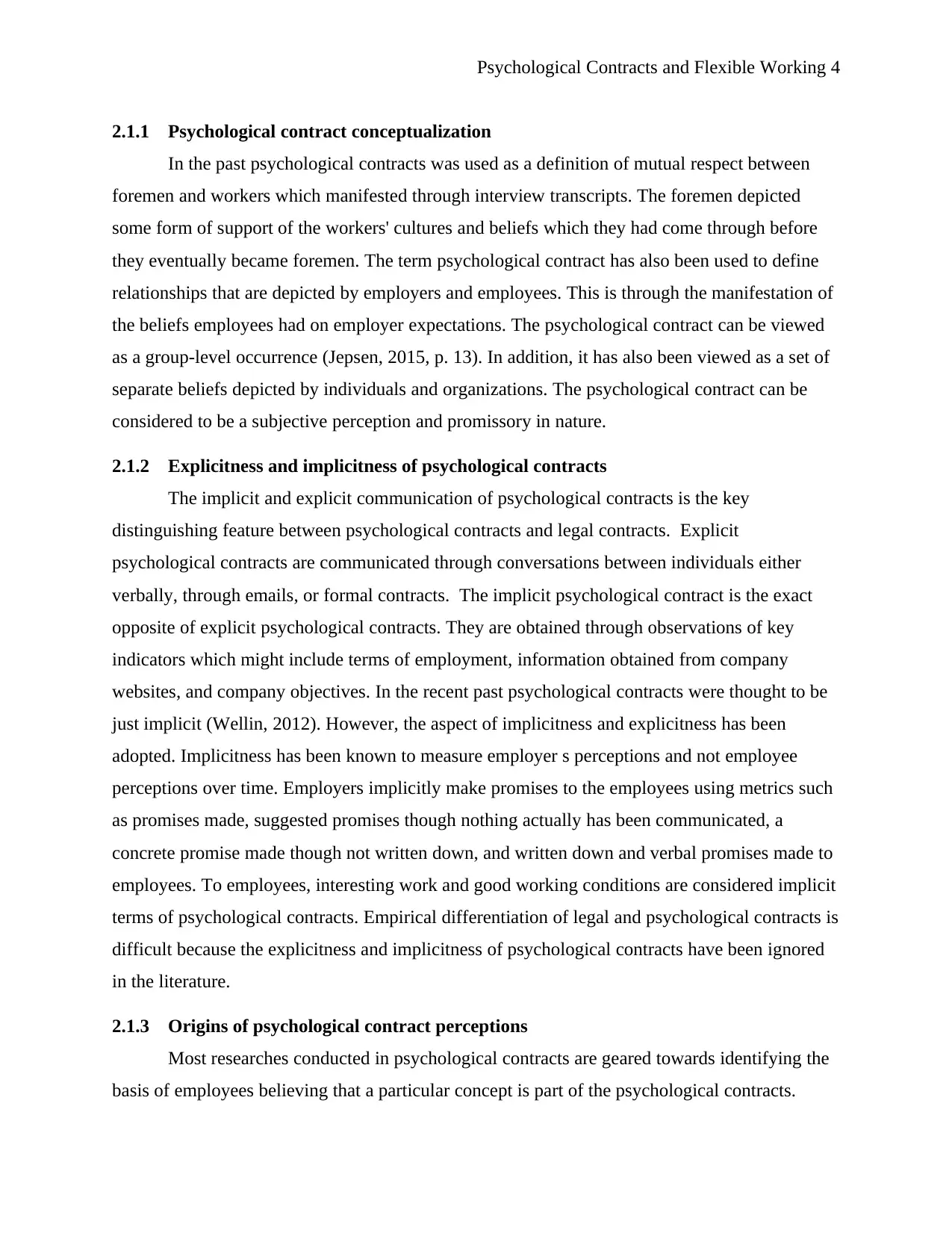
Psychological Contracts and Flexible Working 4
2.1.1 Psychological contract conceptualization
In the past psychological contracts was used as a definition of mutual respect between
foremen and workers which manifested through interview transcripts. The foremen depicted
some form of support of the workers' cultures and beliefs which they had come through before
they eventually became foremen. The term psychological contract has also been used to define
relationships that are depicted by employers and employees. This is through the manifestation of
the beliefs employees had on employer expectations. The psychological contract can be viewed
as a group-level occurrence (Jepsen, 2015, p. 13). In addition, it has also been viewed as a set of
separate beliefs depicted by individuals and organizations. The psychological contract can be
considered to be a subjective perception and promissory in nature.
2.1.2 Explicitness and implicitness of psychological contracts
The implicit and explicit communication of psychological contracts is the key
distinguishing feature between psychological contracts and legal contracts. Explicit
psychological contracts are communicated through conversations between individuals either
verbally, through emails, or formal contracts. The implicit psychological contract is the exact
opposite of explicit psychological contracts. They are obtained through observations of key
indicators which might include terms of employment, information obtained from company
websites, and company objectives. In the recent past psychological contracts were thought to be
just implicit (Wellin, 2012). However, the aspect of implicitness and explicitness has been
adopted. Implicitness has been known to measure employer s perceptions and not employee
perceptions over time. Employers implicitly make promises to the employees using metrics such
as promises made, suggested promises though nothing actually has been communicated, a
concrete promise made though not written down, and written down and verbal promises made to
employees. To employees, interesting work and good working conditions are considered implicit
terms of psychological contracts. Empirical differentiation of legal and psychological contracts is
difficult because the explicitness and implicitness of psychological contracts have been ignored
in the literature.
2.1.3 Origins of psychological contract perceptions
Most researches conducted in psychological contracts are geared towards identifying the
basis of employees believing that a particular concept is part of the psychological contracts.
2.1.1 Psychological contract conceptualization
In the past psychological contracts was used as a definition of mutual respect between
foremen and workers which manifested through interview transcripts. The foremen depicted
some form of support of the workers' cultures and beliefs which they had come through before
they eventually became foremen. The term psychological contract has also been used to define
relationships that are depicted by employers and employees. This is through the manifestation of
the beliefs employees had on employer expectations. The psychological contract can be viewed
as a group-level occurrence (Jepsen, 2015, p. 13). In addition, it has also been viewed as a set of
separate beliefs depicted by individuals and organizations. The psychological contract can be
considered to be a subjective perception and promissory in nature.
2.1.2 Explicitness and implicitness of psychological contracts
The implicit and explicit communication of psychological contracts is the key
distinguishing feature between psychological contracts and legal contracts. Explicit
psychological contracts are communicated through conversations between individuals either
verbally, through emails, or formal contracts. The implicit psychological contract is the exact
opposite of explicit psychological contracts. They are obtained through observations of key
indicators which might include terms of employment, information obtained from company
websites, and company objectives. In the recent past psychological contracts were thought to be
just implicit (Wellin, 2012). However, the aspect of implicitness and explicitness has been
adopted. Implicitness has been known to measure employer s perceptions and not employee
perceptions over time. Employers implicitly make promises to the employees using metrics such
as promises made, suggested promises though nothing actually has been communicated, a
concrete promise made though not written down, and written down and verbal promises made to
employees. To employees, interesting work and good working conditions are considered implicit
terms of psychological contracts. Empirical differentiation of legal and psychological contracts is
difficult because the explicitness and implicitness of psychological contracts have been ignored
in the literature.
2.1.3 Origins of psychological contract perceptions
Most researches conducted in psychological contracts are geared towards identifying the
basis of employees believing that a particular concept is part of the psychological contracts.
Paraphrase This Document
Need a fresh take? Get an instant paraphrase of this document with our AI Paraphraser
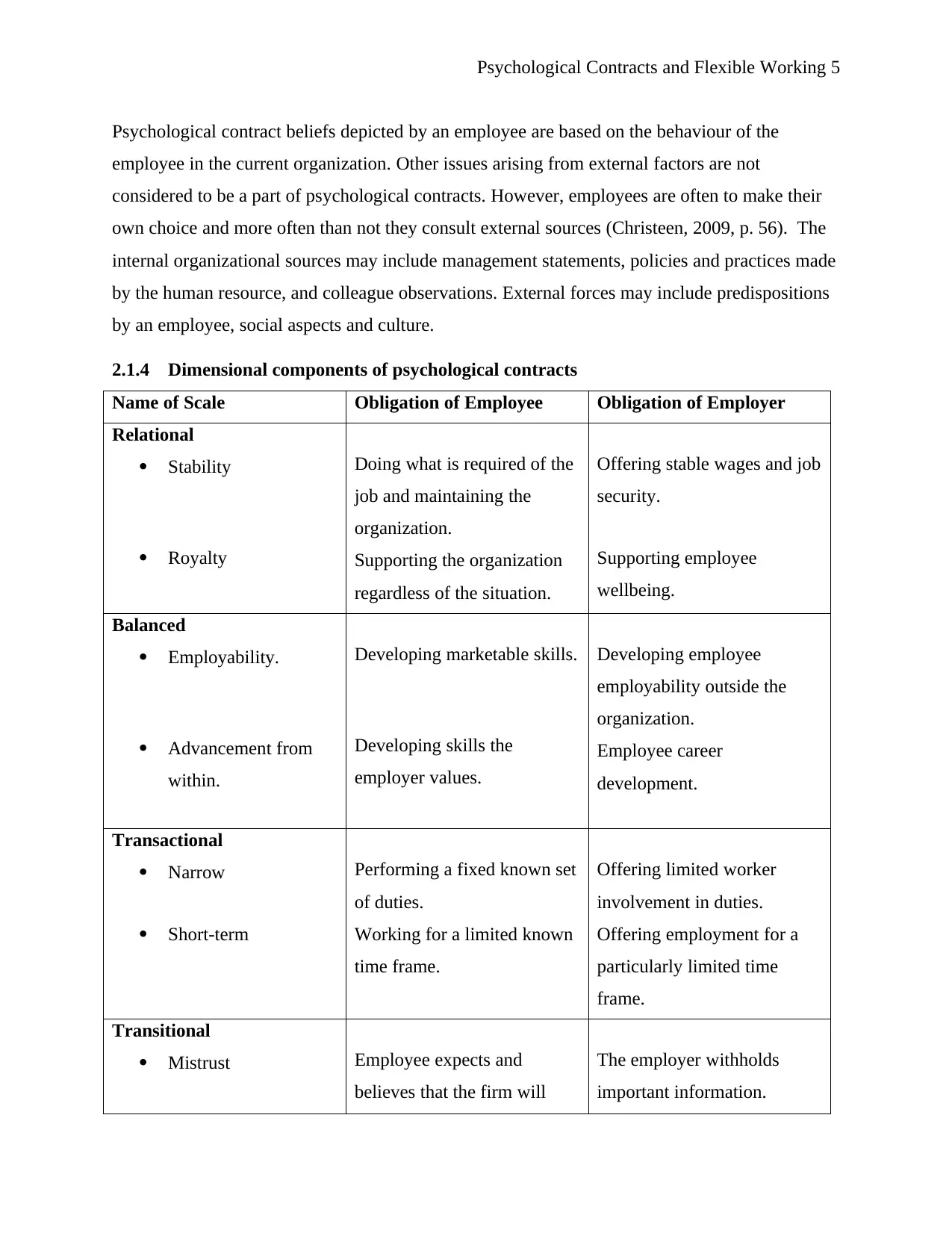
Psychological Contracts and Flexible Working 5
Psychological contract beliefs depicted by an employee are based on the behaviour of the
employee in the current organization. Other issues arising from external factors are not
considered to be a part of psychological contracts. However, employees are often to make their
own choice and more often than not they consult external sources (Christeen, 2009, p. 56). The
internal organizational sources may include management statements, policies and practices made
by the human resource, and colleague observations. External forces may include predispositions
by an employee, social aspects and culture.
2.1.4 Dimensional components of psychological contracts
Name of Scale Obligation of Employee Obligation of Employer
Relational
Stability
Royalty
Doing what is required of the
job and maintaining the
organization.
Supporting the organization
regardless of the situation.
Offering stable wages and job
security.
Supporting employee
wellbeing.
Balanced
Employability.
Advancement from
within.
Developing marketable skills.
Developing skills the
employer values.
Developing employee
employability outside the
organization.
Employee career
development.
Transactional
Narrow
Short-term
Performing a fixed known set
of duties.
Working for a limited known
time frame.
Offering limited worker
involvement in duties.
Offering employment for a
particularly limited time
frame.
Transitional
Mistrust Employee expects and
believes that the firm will
The employer withholds
important information.
Psychological contract beliefs depicted by an employee are based on the behaviour of the
employee in the current organization. Other issues arising from external factors are not
considered to be a part of psychological contracts. However, employees are often to make their
own choice and more often than not they consult external sources (Christeen, 2009, p. 56). The
internal organizational sources may include management statements, policies and practices made
by the human resource, and colleague observations. External forces may include predispositions
by an employee, social aspects and culture.
2.1.4 Dimensional components of psychological contracts
Name of Scale Obligation of Employee Obligation of Employer
Relational
Stability
Royalty
Doing what is required of the
job and maintaining the
organization.
Supporting the organization
regardless of the situation.
Offering stable wages and job
security.
Supporting employee
wellbeing.
Balanced
Employability.
Advancement from
within.
Developing marketable skills.
Developing skills the
employer values.
Developing employee
employability outside the
organization.
Employee career
development.
Transactional
Narrow
Short-term
Performing a fixed known set
of duties.
Working for a limited known
time frame.
Offering limited worker
involvement in duties.
Offering employment for a
particularly limited time
frame.
Transitional
Mistrust Employee expects and
believes that the firm will
The employer withholds
important information.
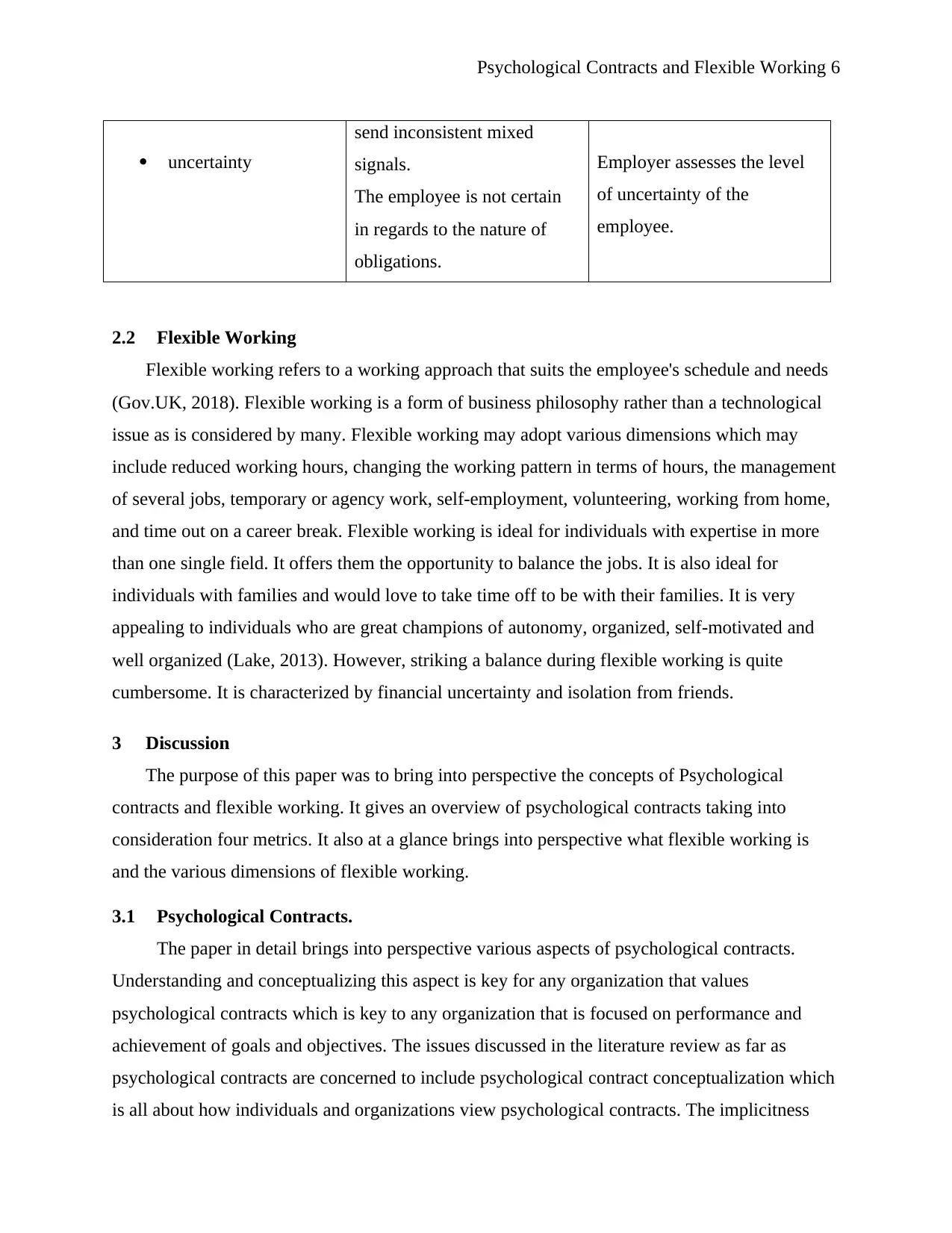
Psychological Contracts and Flexible Working 6
uncertainty
send inconsistent mixed
signals.
The employee is not certain
in regards to the nature of
obligations.
Employer assesses the level
of uncertainty of the
employee.
2.2 Flexible Working
Flexible working refers to a working approach that suits the employee's schedule and needs
(Gov.UK, 2018). Flexible working is a form of business philosophy rather than a technological
issue as is considered by many. Flexible working may adopt various dimensions which may
include reduced working hours, changing the working pattern in terms of hours, the management
of several jobs, temporary or agency work, self-employment, volunteering, working from home,
and time out on a career break. Flexible working is ideal for individuals with expertise in more
than one single field. It offers them the opportunity to balance the jobs. It is also ideal for
individuals with families and would love to take time off to be with their families. It is very
appealing to individuals who are great champions of autonomy, organized, self-motivated and
well organized (Lake, 2013). However, striking a balance during flexible working is quite
cumbersome. It is characterized by financial uncertainty and isolation from friends.
3 Discussion
The purpose of this paper was to bring into perspective the concepts of Psychological
contracts and flexible working. It gives an overview of psychological contracts taking into
consideration four metrics. It also at a glance brings into perspective what flexible working is
and the various dimensions of flexible working.
3.1 Psychological Contracts.
The paper in detail brings into perspective various aspects of psychological contracts.
Understanding and conceptualizing this aspect is key for any organization that values
psychological contracts which is key to any organization that is focused on performance and
achievement of goals and objectives. The issues discussed in the literature review as far as
psychological contracts are concerned to include psychological contract conceptualization which
is all about how individuals and organizations view psychological contracts. The implicitness
uncertainty
send inconsistent mixed
signals.
The employee is not certain
in regards to the nature of
obligations.
Employer assesses the level
of uncertainty of the
employee.
2.2 Flexible Working
Flexible working refers to a working approach that suits the employee's schedule and needs
(Gov.UK, 2018). Flexible working is a form of business philosophy rather than a technological
issue as is considered by many. Flexible working may adopt various dimensions which may
include reduced working hours, changing the working pattern in terms of hours, the management
of several jobs, temporary or agency work, self-employment, volunteering, working from home,
and time out on a career break. Flexible working is ideal for individuals with expertise in more
than one single field. It offers them the opportunity to balance the jobs. It is also ideal for
individuals with families and would love to take time off to be with their families. It is very
appealing to individuals who are great champions of autonomy, organized, self-motivated and
well organized (Lake, 2013). However, striking a balance during flexible working is quite
cumbersome. It is characterized by financial uncertainty and isolation from friends.
3 Discussion
The purpose of this paper was to bring into perspective the concepts of Psychological
contracts and flexible working. It gives an overview of psychological contracts taking into
consideration four metrics. It also at a glance brings into perspective what flexible working is
and the various dimensions of flexible working.
3.1 Psychological Contracts.
The paper in detail brings into perspective various aspects of psychological contracts.
Understanding and conceptualizing this aspect is key for any organization that values
psychological contracts which is key to any organization that is focused on performance and
achievement of goals and objectives. The issues discussed in the literature review as far as
psychological contracts are concerned to include psychological contract conceptualization which
is all about how individuals and organizations view psychological contracts. The implicitness
⊘ This is a preview!⊘
Do you want full access?
Subscribe today to unlock all pages.

Trusted by 1+ million students worldwide
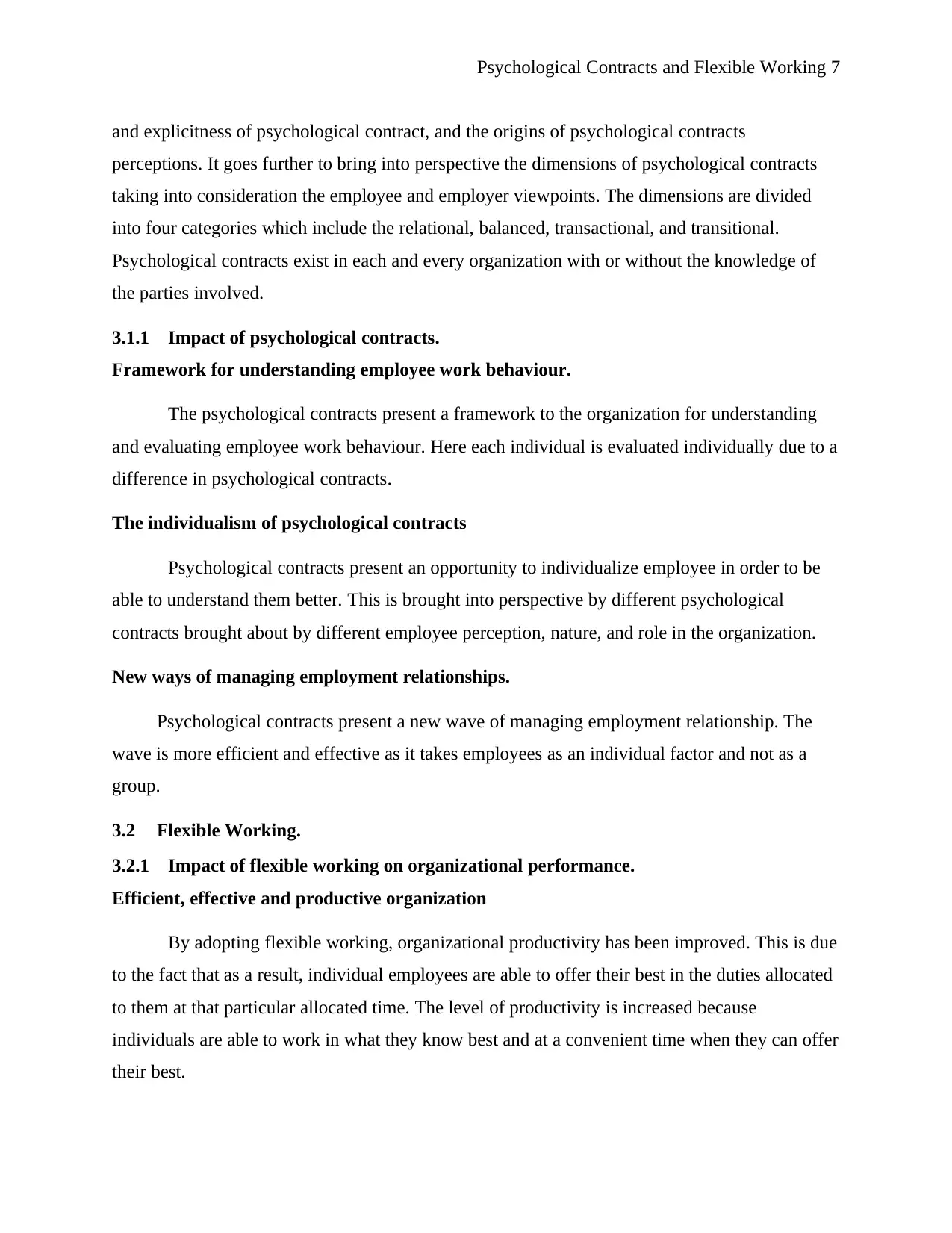
Psychological Contracts and Flexible Working 7
and explicitness of psychological contract, and the origins of psychological contracts
perceptions. It goes further to bring into perspective the dimensions of psychological contracts
taking into consideration the employee and employer viewpoints. The dimensions are divided
into four categories which include the relational, balanced, transactional, and transitional.
Psychological contracts exist in each and every organization with or without the knowledge of
the parties involved.
3.1.1 Impact of psychological contracts.
Framework for understanding employee work behaviour.
The psychological contracts present a framework to the organization for understanding
and evaluating employee work behaviour. Here each individual is evaluated individually due to a
difference in psychological contracts.
The individualism of psychological contracts
Psychological contracts present an opportunity to individualize employee in order to be
able to understand them better. This is brought into perspective by different psychological
contracts brought about by different employee perception, nature, and role in the organization.
New ways of managing employment relationships.
Psychological contracts present a new wave of managing employment relationship. The
wave is more efficient and effective as it takes employees as an individual factor and not as a
group.
3.2 Flexible Working.
3.2.1 Impact of flexible working on organizational performance.
Efficient, effective and productive organization
By adopting flexible working, organizational productivity has been improved. This is due
to the fact that as a result, individual employees are able to offer their best in the duties allocated
to them at that particular allocated time. The level of productivity is increased because
individuals are able to work in what they know best and at a convenient time when they can offer
their best.
and explicitness of psychological contract, and the origins of psychological contracts
perceptions. It goes further to bring into perspective the dimensions of psychological contracts
taking into consideration the employee and employer viewpoints. The dimensions are divided
into four categories which include the relational, balanced, transactional, and transitional.
Psychological contracts exist in each and every organization with or without the knowledge of
the parties involved.
3.1.1 Impact of psychological contracts.
Framework for understanding employee work behaviour.
The psychological contracts present a framework to the organization for understanding
and evaluating employee work behaviour. Here each individual is evaluated individually due to a
difference in psychological contracts.
The individualism of psychological contracts
Psychological contracts present an opportunity to individualize employee in order to be
able to understand them better. This is brought into perspective by different psychological
contracts brought about by different employee perception, nature, and role in the organization.
New ways of managing employment relationships.
Psychological contracts present a new wave of managing employment relationship. The
wave is more efficient and effective as it takes employees as an individual factor and not as a
group.
3.2 Flexible Working.
3.2.1 Impact of flexible working on organizational performance.
Efficient, effective and productive organization
By adopting flexible working, organizational productivity has been improved. This is due
to the fact that as a result, individual employees are able to offer their best in the duties allocated
to them at that particular allocated time. The level of productivity is increased because
individuals are able to work in what they know best and at a convenient time when they can offer
their best.
Paraphrase This Document
Need a fresh take? Get an instant paraphrase of this document with our AI Paraphraser
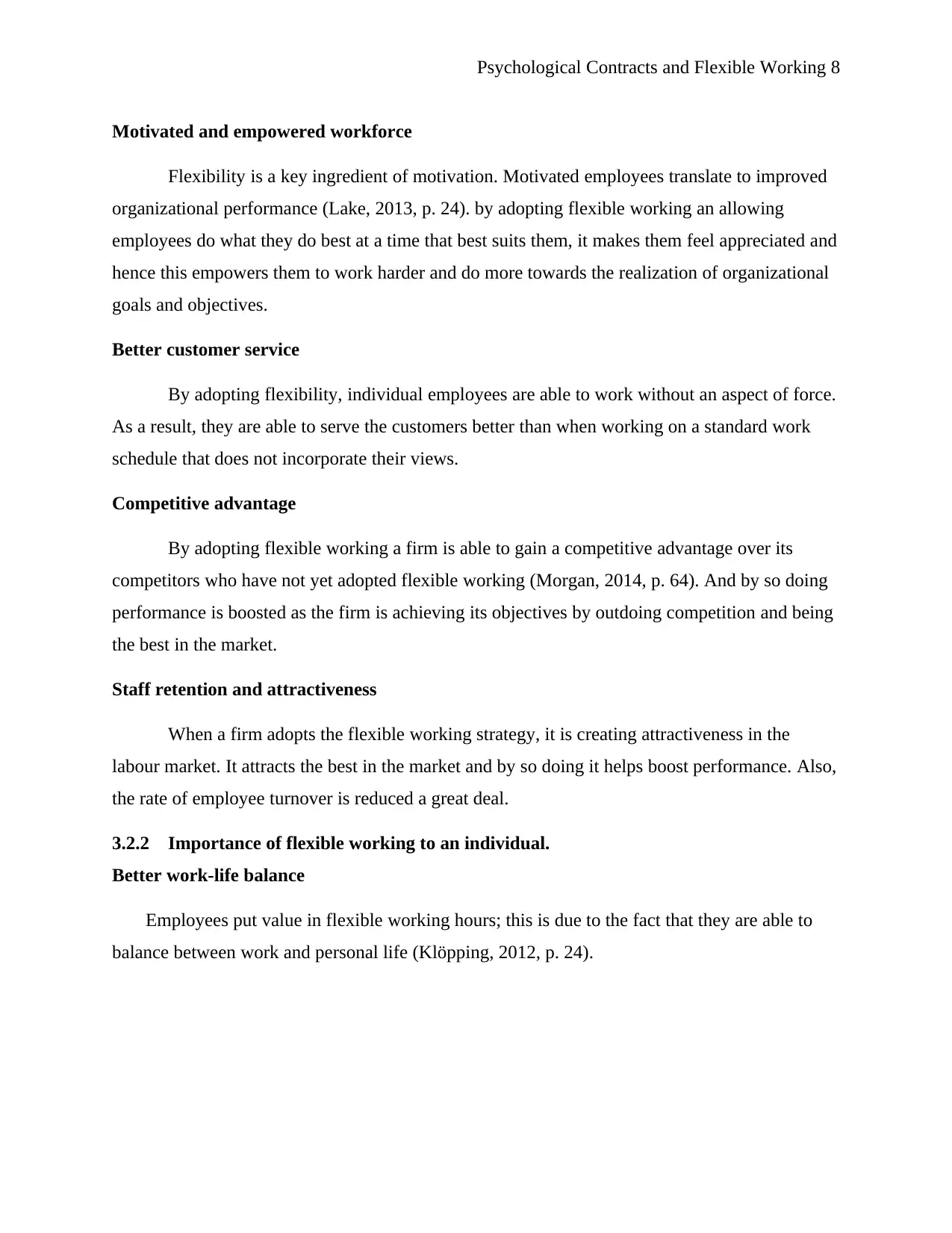
Psychological Contracts and Flexible Working 8
Motivated and empowered workforce
Flexibility is a key ingredient of motivation. Motivated employees translate to improved
organizational performance (Lake, 2013, p. 24). by adopting flexible working an allowing
employees do what they do best at a time that best suits them, it makes them feel appreciated and
hence this empowers them to work harder and do more towards the realization of organizational
goals and objectives.
Better customer service
By adopting flexibility, individual employees are able to work without an aspect of force.
As a result, they are able to serve the customers better than when working on a standard work
schedule that does not incorporate their views.
Competitive advantage
By adopting flexible working a firm is able to gain a competitive advantage over its
competitors who have not yet adopted flexible working (Morgan, 2014, p. 64). And by so doing
performance is boosted as the firm is achieving its objectives by outdoing competition and being
the best in the market.
Staff retention and attractiveness
When a firm adopts the flexible working strategy, it is creating attractiveness in the
labour market. It attracts the best in the market and by so doing it helps boost performance. Also,
the rate of employee turnover is reduced a great deal.
3.2.2 Importance of flexible working to an individual.
Better work-life balance
Employees put value in flexible working hours; this is due to the fact that they are able to
balance between work and personal life (Klöpping, 2012, p. 24).
Motivated and empowered workforce
Flexibility is a key ingredient of motivation. Motivated employees translate to improved
organizational performance (Lake, 2013, p. 24). by adopting flexible working an allowing
employees do what they do best at a time that best suits them, it makes them feel appreciated and
hence this empowers them to work harder and do more towards the realization of organizational
goals and objectives.
Better customer service
By adopting flexibility, individual employees are able to work without an aspect of force.
As a result, they are able to serve the customers better than when working on a standard work
schedule that does not incorporate their views.
Competitive advantage
By adopting flexible working a firm is able to gain a competitive advantage over its
competitors who have not yet adopted flexible working (Morgan, 2014, p. 64). And by so doing
performance is boosted as the firm is achieving its objectives by outdoing competition and being
the best in the market.
Staff retention and attractiveness
When a firm adopts the flexible working strategy, it is creating attractiveness in the
labour market. It attracts the best in the market and by so doing it helps boost performance. Also,
the rate of employee turnover is reduced a great deal.
3.2.2 Importance of flexible working to an individual.
Better work-life balance
Employees put value in flexible working hours; this is due to the fact that they are able to
balance between work and personal life (Klöpping, 2012, p. 24).
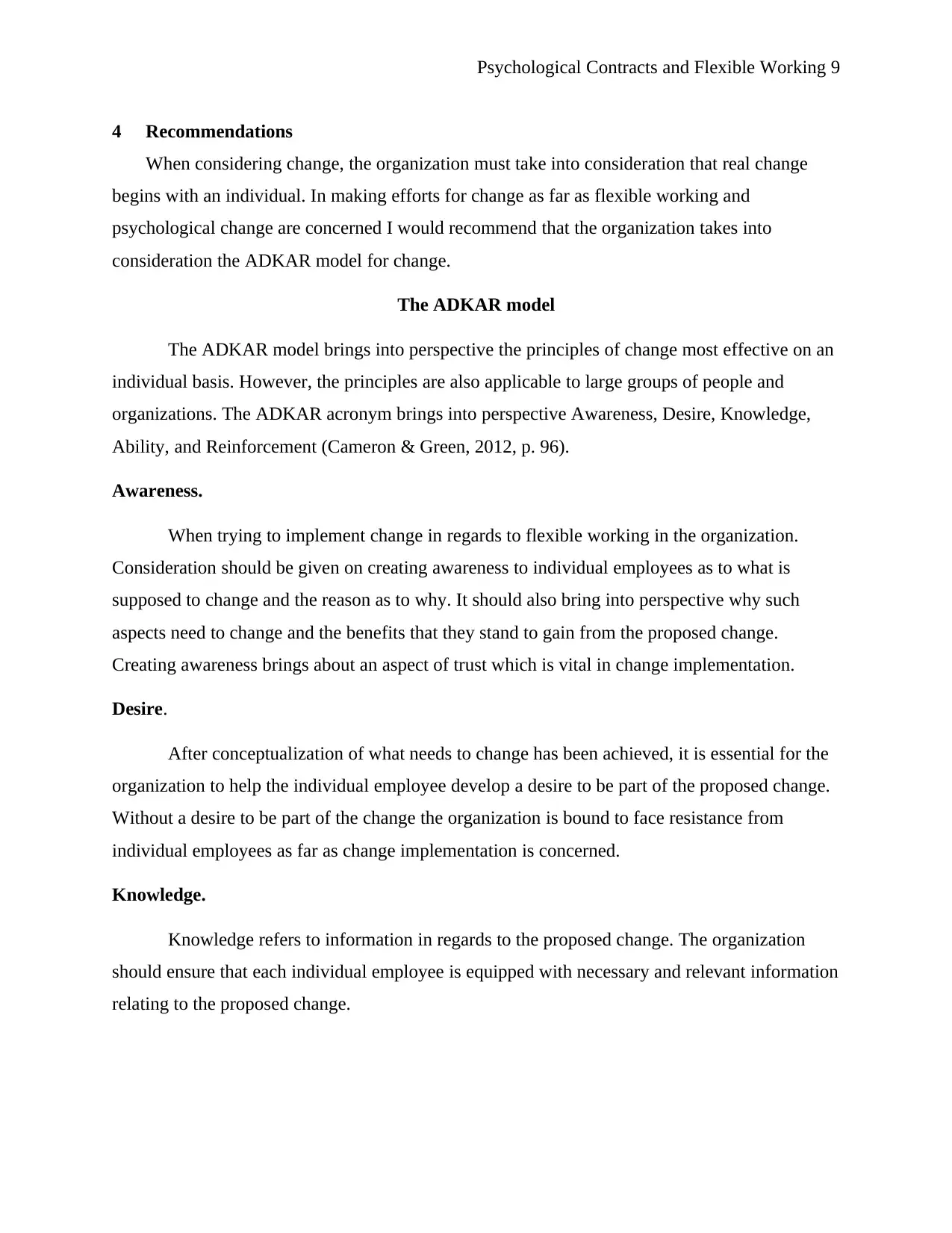
Psychological Contracts and Flexible Working 9
4 Recommendations
When considering change, the organization must take into consideration that real change
begins with an individual. In making efforts for change as far as flexible working and
psychological change are concerned I would recommend that the organization takes into
consideration the ADKAR model for change.
The ADKAR model
The ADKAR model brings into perspective the principles of change most effective on an
individual basis. However, the principles are also applicable to large groups of people and
organizations. The ADKAR acronym brings into perspective Awareness, Desire, Knowledge,
Ability, and Reinforcement (Cameron & Green, 2012, p. 96).
Awareness.
When trying to implement change in regards to flexible working in the organization.
Consideration should be given on creating awareness to individual employees as to what is
supposed to change and the reason as to why. It should also bring into perspective why such
aspects need to change and the benefits that they stand to gain from the proposed change.
Creating awareness brings about an aspect of trust which is vital in change implementation.
Desire.
After conceptualization of what needs to change has been achieved, it is essential for the
organization to help the individual employee develop a desire to be part of the proposed change.
Without a desire to be part of the change the organization is bound to face resistance from
individual employees as far as change implementation is concerned.
Knowledge.
Knowledge refers to information in regards to the proposed change. The organization
should ensure that each individual employee is equipped with necessary and relevant information
relating to the proposed change.
4 Recommendations
When considering change, the organization must take into consideration that real change
begins with an individual. In making efforts for change as far as flexible working and
psychological change are concerned I would recommend that the organization takes into
consideration the ADKAR model for change.
The ADKAR model
The ADKAR model brings into perspective the principles of change most effective on an
individual basis. However, the principles are also applicable to large groups of people and
organizations. The ADKAR acronym brings into perspective Awareness, Desire, Knowledge,
Ability, and Reinforcement (Cameron & Green, 2012, p. 96).
Awareness.
When trying to implement change in regards to flexible working in the organization.
Consideration should be given on creating awareness to individual employees as to what is
supposed to change and the reason as to why. It should also bring into perspective why such
aspects need to change and the benefits that they stand to gain from the proposed change.
Creating awareness brings about an aspect of trust which is vital in change implementation.
Desire.
After conceptualization of what needs to change has been achieved, it is essential for the
organization to help the individual employee develop a desire to be part of the proposed change.
Without a desire to be part of the change the organization is bound to face resistance from
individual employees as far as change implementation is concerned.
Knowledge.
Knowledge refers to information in regards to the proposed change. The organization
should ensure that each individual employee is equipped with necessary and relevant information
relating to the proposed change.
⊘ This is a preview!⊘
Do you want full access?
Subscribe today to unlock all pages.

Trusted by 1+ million students worldwide
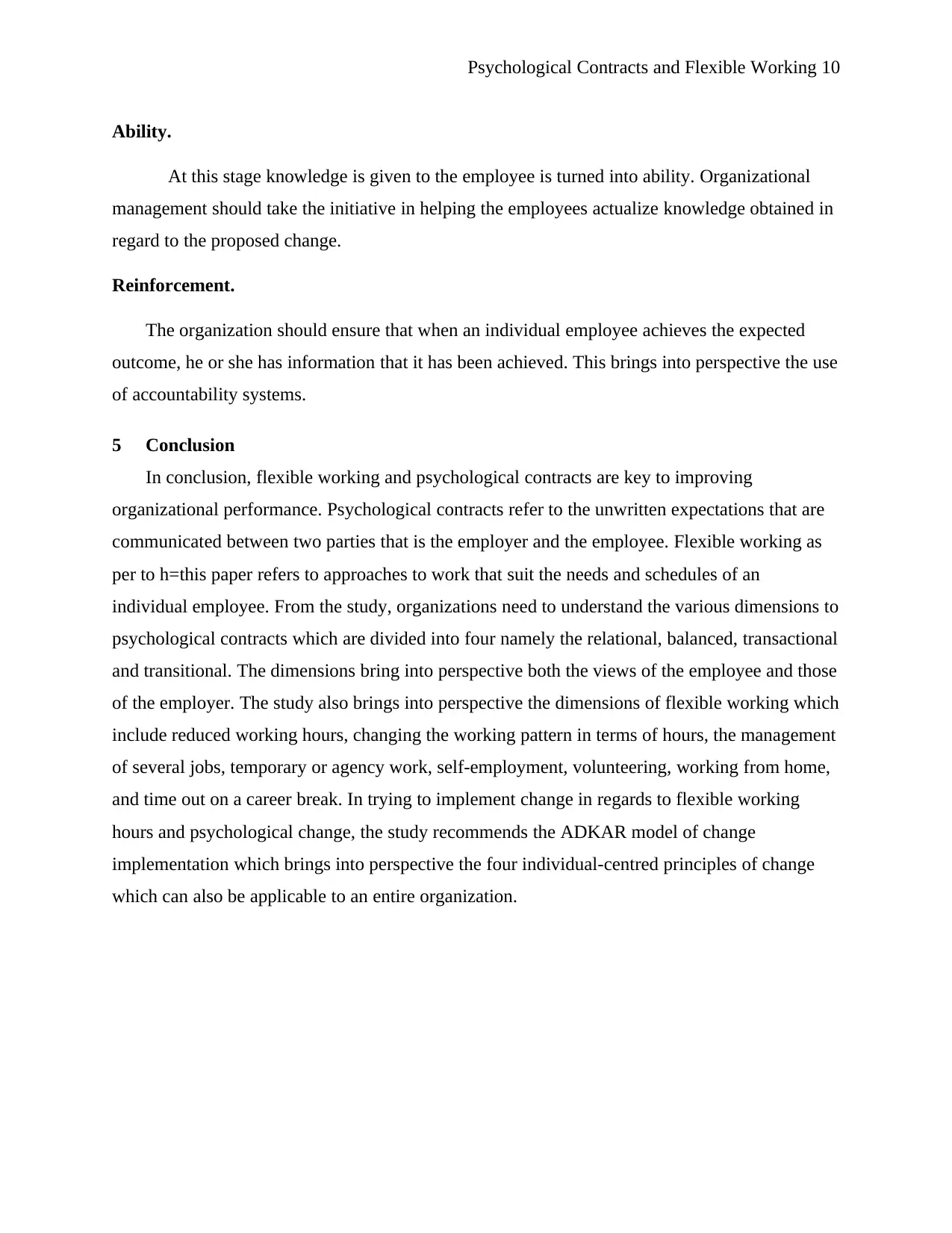
Psychological Contracts and Flexible Working 10
Ability.
At this stage knowledge is given to the employee is turned into ability. Organizational
management should take the initiative in helping the employees actualize knowledge obtained in
regard to the proposed change.
Reinforcement.
The organization should ensure that when an individual employee achieves the expected
outcome, he or she has information that it has been achieved. This brings into perspective the use
of accountability systems.
5 Conclusion
In conclusion, flexible working and psychological contracts are key to improving
organizational performance. Psychological contracts refer to the unwritten expectations that are
communicated between two parties that is the employer and the employee. Flexible working as
per to h=this paper refers to approaches to work that suit the needs and schedules of an
individual employee. From the study, organizations need to understand the various dimensions to
psychological contracts which are divided into four namely the relational, balanced, transactional
and transitional. The dimensions bring into perspective both the views of the employee and those
of the employer. The study also brings into perspective the dimensions of flexible working which
include reduced working hours, changing the working pattern in terms of hours, the management
of several jobs, temporary or agency work, self-employment, volunteering, working from home,
and time out on a career break. In trying to implement change in regards to flexible working
hours and psychological change, the study recommends the ADKAR model of change
implementation which brings into perspective the four individual-centred principles of change
which can also be applicable to an entire organization.
Ability.
At this stage knowledge is given to the employee is turned into ability. Organizational
management should take the initiative in helping the employees actualize knowledge obtained in
regard to the proposed change.
Reinforcement.
The organization should ensure that when an individual employee achieves the expected
outcome, he or she has information that it has been achieved. This brings into perspective the use
of accountability systems.
5 Conclusion
In conclusion, flexible working and psychological contracts are key to improving
organizational performance. Psychological contracts refer to the unwritten expectations that are
communicated between two parties that is the employer and the employee. Flexible working as
per to h=this paper refers to approaches to work that suit the needs and schedules of an
individual employee. From the study, organizations need to understand the various dimensions to
psychological contracts which are divided into four namely the relational, balanced, transactional
and transitional. The dimensions bring into perspective both the views of the employee and those
of the employer. The study also brings into perspective the dimensions of flexible working which
include reduced working hours, changing the working pattern in terms of hours, the management
of several jobs, temporary or agency work, self-employment, volunteering, working from home,
and time out on a career break. In trying to implement change in regards to flexible working
hours and psychological change, the study recommends the ADKAR model of change
implementation which brings into perspective the four individual-centred principles of change
which can also be applicable to an entire organization.
Paraphrase This Document
Need a fresh take? Get an instant paraphrase of this document with our AI Paraphraser
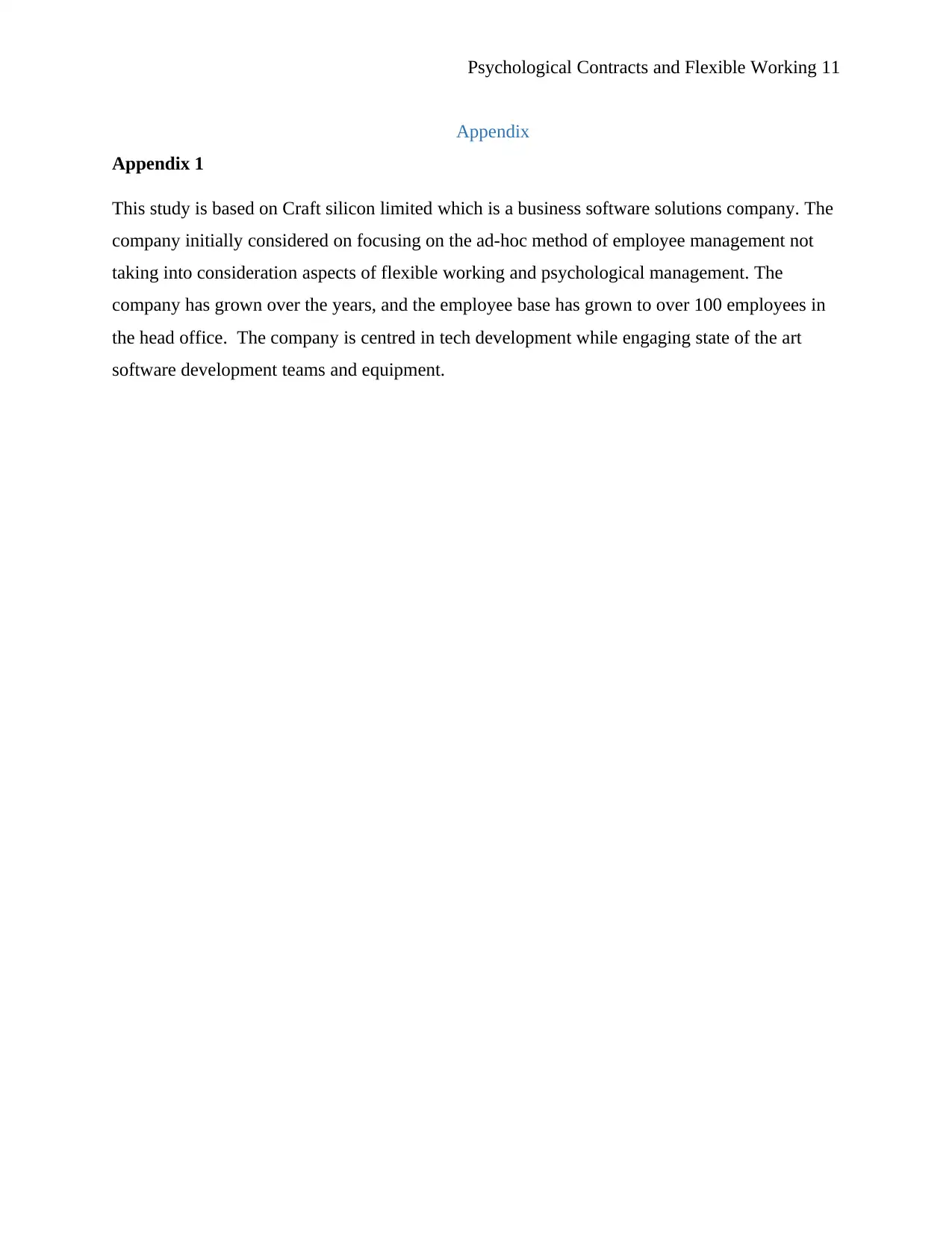
Psychological Contracts and Flexible Working 11
Appendix
Appendix 1
This study is based on Craft silicon limited which is a business software solutions company. The
company initially considered on focusing on the ad-hoc method of employee management not
taking into consideration aspects of flexible working and psychological management. The
company has grown over the years, and the employee base has grown to over 100 employees in
the head office. The company is centred in tech development while engaging state of the art
software development teams and equipment.
Appendix
Appendix 1
This study is based on Craft silicon limited which is a business software solutions company. The
company initially considered on focusing on the ad-hoc method of employee management not
taking into consideration aspects of flexible working and psychological management. The
company has grown over the years, and the employee base has grown to over 100 employees in
the head office. The company is centred in tech development while engaging state of the art
software development teams and equipment.
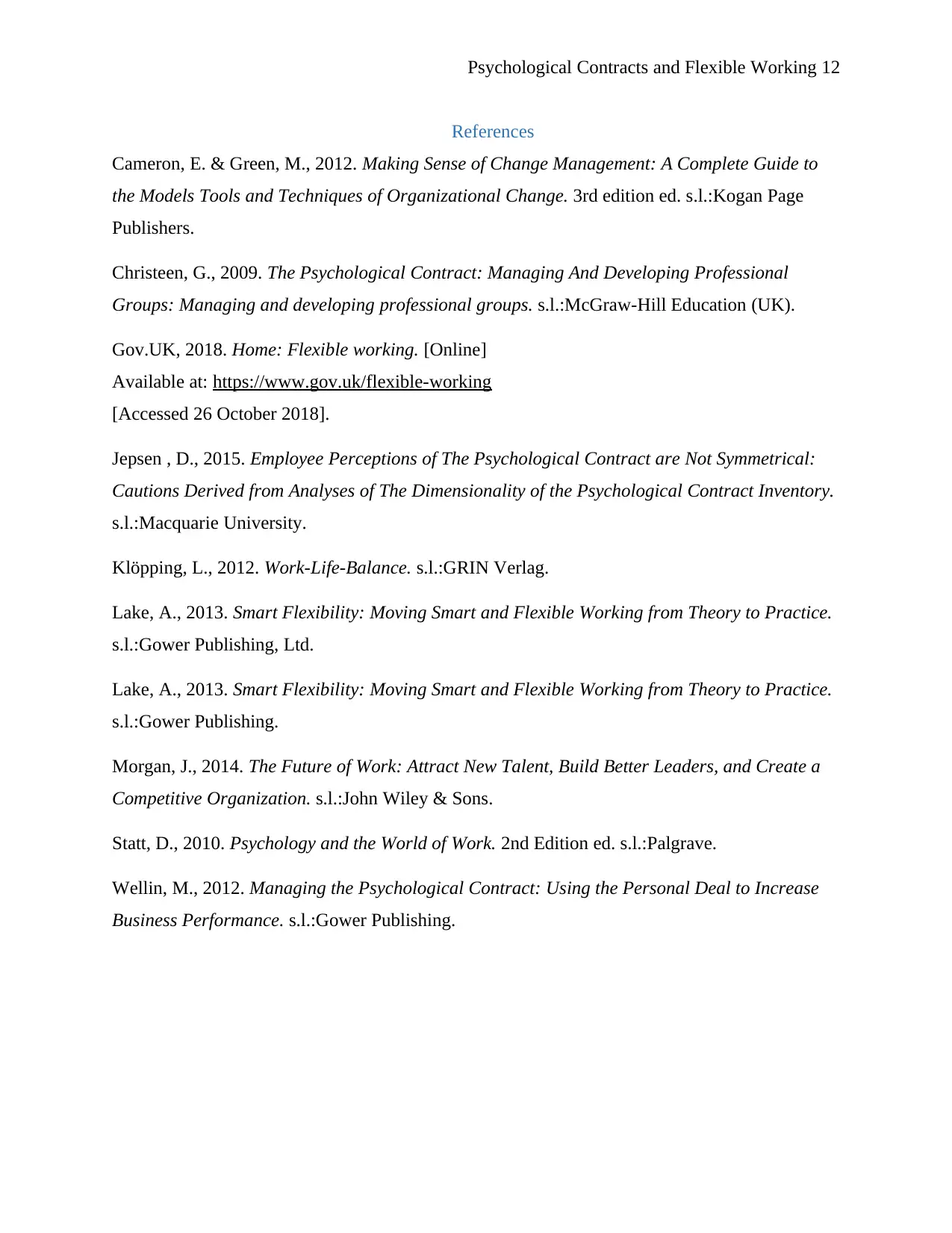
Psychological Contracts and Flexible Working 12
References
Cameron, E. & Green, M., 2012. Making Sense of Change Management: A Complete Guide to
the Models Tools and Techniques of Organizational Change. 3rd edition ed. s.l.:Kogan Page
Publishers.
Christeen, G., 2009. The Psychological Contract: Managing And Developing Professional
Groups: Managing and developing professional groups. s.l.:McGraw-Hill Education (UK).
Gov.UK, 2018. Home: Flexible working. [Online]
Available at: https://www.gov.uk/flexible-working
[Accessed 26 October 2018].
Jepsen , D., 2015. Employee Perceptions of The Psychological Contract are Not Symmetrical:
Cautions Derived from Analyses of The Dimensionality of the Psychological Contract Inventory.
s.l.:Macquarie University.
Klöpping, L., 2012. Work-Life-Balance. s.l.:GRIN Verlag.
Lake, A., 2013. Smart Flexibility: Moving Smart and Flexible Working from Theory to Practice.
s.l.:Gower Publishing, Ltd.
Lake, A., 2013. Smart Flexibility: Moving Smart and Flexible Working from Theory to Practice.
s.l.:Gower Publishing.
Morgan, J., 2014. The Future of Work: Attract New Talent, Build Better Leaders, and Create a
Competitive Organization. s.l.:John Wiley & Sons.
Statt, D., 2010. Psychology and the World of Work. 2nd Edition ed. s.l.:Palgrave.
Wellin, M., 2012. Managing the Psychological Contract: Using the Personal Deal to Increase
Business Performance. s.l.:Gower Publishing.
References
Cameron, E. & Green, M., 2012. Making Sense of Change Management: A Complete Guide to
the Models Tools and Techniques of Organizational Change. 3rd edition ed. s.l.:Kogan Page
Publishers.
Christeen, G., 2009. The Psychological Contract: Managing And Developing Professional
Groups: Managing and developing professional groups. s.l.:McGraw-Hill Education (UK).
Gov.UK, 2018. Home: Flexible working. [Online]
Available at: https://www.gov.uk/flexible-working
[Accessed 26 October 2018].
Jepsen , D., 2015. Employee Perceptions of The Psychological Contract are Not Symmetrical:
Cautions Derived from Analyses of The Dimensionality of the Psychological Contract Inventory.
s.l.:Macquarie University.
Klöpping, L., 2012. Work-Life-Balance. s.l.:GRIN Verlag.
Lake, A., 2013. Smart Flexibility: Moving Smart and Flexible Working from Theory to Practice.
s.l.:Gower Publishing, Ltd.
Lake, A., 2013. Smart Flexibility: Moving Smart and Flexible Working from Theory to Practice.
s.l.:Gower Publishing.
Morgan, J., 2014. The Future of Work: Attract New Talent, Build Better Leaders, and Create a
Competitive Organization. s.l.:John Wiley & Sons.
Statt, D., 2010. Psychology and the World of Work. 2nd Edition ed. s.l.:Palgrave.
Wellin, M., 2012. Managing the Psychological Contract: Using the Personal Deal to Increase
Business Performance. s.l.:Gower Publishing.
⊘ This is a preview!⊘
Do you want full access?
Subscribe today to unlock all pages.

Trusted by 1+ million students worldwide
1 out of 12
Related Documents
Your All-in-One AI-Powered Toolkit for Academic Success.
+13062052269
info@desklib.com
Available 24*7 on WhatsApp / Email
![[object Object]](/_next/static/media/star-bottom.7253800d.svg)
Unlock your academic potential
Copyright © 2020–2025 A2Z Services. All Rights Reserved. Developed and managed by ZUCOL.





